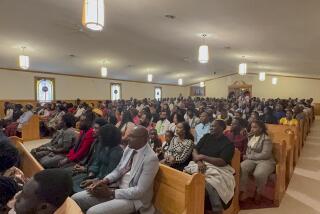An Emotional Juncture in Haiti’s Chaotic History : Caribbean: With some calling for reconciliation and others crying for justice, the future remains uncertain.
- Share via
PORT-AU-PRINCE, Haiti — The brother of slain Justice Minister Guy Malary trembled as he stood in the pulpit of Sacre Coeur Church on Friday, his hands raised before a solemn audience that included some of exiled President Jean-Bertrand Aristide’s most high-profile supporters.
“Is it justice,” he cried, “when they kill our people and then they are allowed to leave the country?
“Is that justice?” he asked, referring to the lucrative, U.S.-sponsored departure of Haiti’s military dictators. Some in the audience sobbed and burst into shouts for justice and the president they hope will bring it--Aristide.
The memorial Mass for Malary, who was assassinated by pro-military henchmen a year ago, was in equal parts homage to a dead man and celebration of Aristide’s anticipated return today.
“Reconciliation has started!” proclaimed the Rev. Gerard Jean-Juste, presiding over the service in French but switching to English and Creole for key passages. “Look around you and you shall see. Open your eyes and you shall see.”
The audience included pro-Aristide legislators who only recently emerged from hiding and members of a caretaker Aristide-sanctioned Cabinet making its first joint public appearance in a year. The diplomatic corps, including U.S. Ambassador William L. Swing, and a handful of attorneys, doctors and a bank president also attended.
Significantly, the papal nuncio--a bitter enemy of Aristide since he was suspended as a priest in 1988--and at least one anti-Aristide bishop also joined in the ceremony.
Emotions surrounding the return of Aristide are reaching fever pitch in this polarized nation--among the Haitian masses for whom the returning president represents salvation, and among the elite and business class who fear that he will not control the popular violence that threatens to explode at any minute.
“It is like we were tied with rope, and Aristide will come to untie us,” said Berenise Pierre, a 23-year-old church worker who helped sing “We Shall Overcome” at the conclusion of the Mass.
But as the tearful plea of Malary’s brother, Luckner, indicated, the issues of justice and reconciliation sometimes work at cross purposes. U.S. officials and some Haitians argue that social peace could be maintained, and the wounds of society healed, only with the removal from Haiti of former strongman Lt. Gen. Raoul Cedras and his associates.
Other Haitians, however, want to see the leaders of Haiti’s brutal dictatorship punished for the murders, rapes and tortures they allowed in the three years since the coup that overthrew Aristide.
“We understand the emotions of those who suffered,” Jean-Juste told reporters after the service. “But now we hope everybody is more conscious and decided to reject violence. . . . We have no other choice.”
Outside the downtown church, Malary’s relatives laid floral arrangements of white carnations and blue candles along the sidewalk where the justice minister, his bodyguard and his driver were gunned down. The gunmen chased the three from Malary’s office until running their car onto the sidewalk and opening fire. The brick wall still bears the gash where Malary’s car crashed.
The assassination of Malary was a turning point in the Haitian crisis. It came two days after a pro-military mob turned away the U.S. military cargo ship Harlan County, which was attempting to dock, and formed part of the world’s growing awareness at the time that Cedras had no intention of obeying an agreement that provided for Aristide’s return.
The Governor’s Island accord, which Cedras and Aristide signed in July, 1993, called for Cedras to step down by Oct. 15 of that year and for Aristide to resume Haiti’s presidency. Neither would happen until this week.
For Aristide’s many supporters, there was an air of elation Friday. Vendors hawked T-shirts with his picture, passengers waved Aristide flags from their public buses, and residents of Port-au-Prince’s most miserable slums painted murals in his honor. Many planned an all-night vigil Friday as a form of ad-hoc security.
Late Friday, thousands of Haitians were roaming the streets of Port-au-Prince, chanting pro-Aristide slogans and playing musical instruments to celebrate his impending return.
For his detractors, there was dread. They have seen looting and beatings by mobs in recent days, and they fear a return of the social upheaval that followed the demise of the Duvalier dynasty in 1986.
“People are concerned about . . . anarchy,” attorney Sybille Theard Mevs, a member of one of Haiti’s wealthiest families, said in an interview. “People are concerned because there is no state of law, no rules. Who will guarantee the security of anyone?”
Swing, the American ambassador, said the U.S. military would continue to provide security.
“But,” he said in the foyer of Sacre Coeur Church, “it’s not a perfect world yet. There are a lot of divisions and a lot of guns out there. There is a large potential for violence. We have not had success in creating for Haiti a culture of nonviolence. That’s the ultimate objective.”
More to Read
Sign up for Essential California
The most important California stories and recommendations in your inbox every morning.
You may occasionally receive promotional content from the Los Angeles Times.











